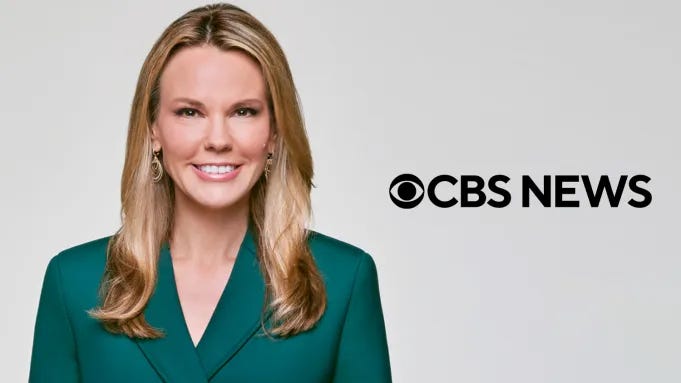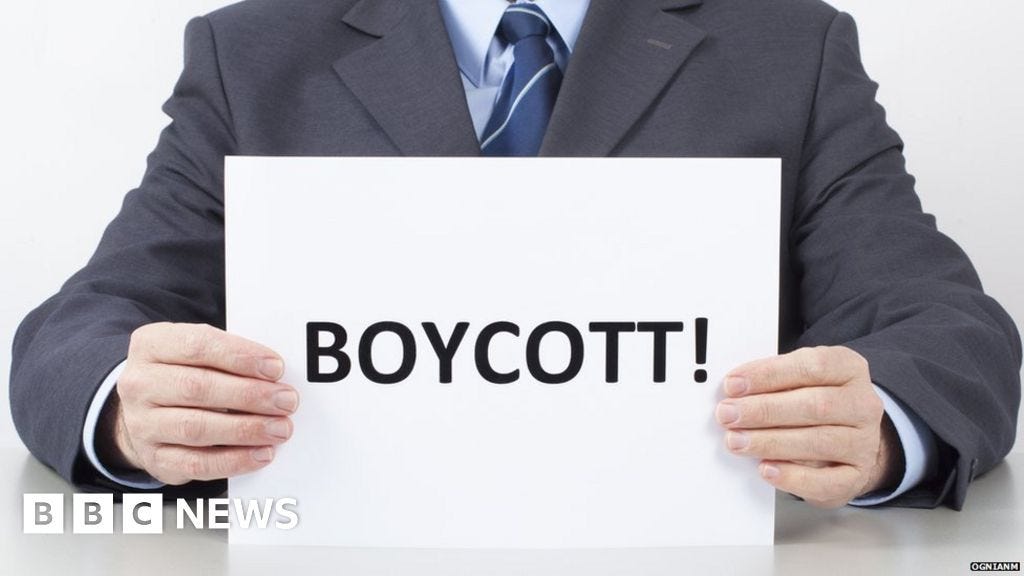As a top exec leaves CBS News, a question: boycott or not?
What's a fan to do when corporate owners threaten a news outlet's journalistic independence?
Now that two top CBS News executives who fought for journalism independence are gone from the company, there is a new question for consumers who might love 60 Minutes and the CBS Evening News.
Keep watching? Or boycott?
News emerged Monday that Wendy McMahon, the president and CEO of CBS Media Ventures along with CBS News and Stations, resigned, saying in a memo to staff, “It’s become clear that the company and I do not agree on the path forward.” CNBC reports she was asked to resign Saturday by Paramount Global co-CEO George Cheeks.
Her departure comes about a month after 60 Minutes executive producer Bill Owens left the company, saying in his own memo to staffers, "Over the past months, it has also become clear that I would not be allowed to run the show as I have always run it.”
Looming over all of this is efforts by CBS News’ parent company, Paramount, to sell itself to Skydance Media in a deal which requires government approval. President Donald Trump also is pushing a $20 billion lawsuit against the company – with claims about 60 Minutes’ editing of a Kamala Harris interview which would likely have little sway in a fair court. But Paramount reportedly has agreed to mediation to settle the lawsuit, an outcome Owens and McMahon resisted.
There’s also reporting that Shari Redstone, Paramount’s controlling owner, criticized 60 Minutes’ reporting on violence in Gaza and may have tried to keep tabs on the show’s reporting about Trump (a representative for Redstone has denied that she saw or sought to see 60 Minutes stories in advance).
Just this year, 60 Minutes has offered incisive reports on Trump’s efforts to target law firms he does not like, the effects of Trump’s silencing of Voice of America, the significance of Trump firing independent federal watchdogs, and the forced canceling of a concert by the U.S. Marine Band with students of color after Trump’s anti-DEI executive order.
Whatever corporate pressure they were facing earlier this year, 60 Minutes has managed to get tough reporting about Trump on its show. But now that McMahon and Owens are gone, will that continue? And how should fans of the show, who want to support its independence, respond now?
I’ve heard from a lot of folks on social media who want to boycott, convinced that most traditional media outlets are compromised and cannot be trusted. And I certainly understand that impulse. When an ouster like this takes place in the open, threatening the quality of TV journalism’s most admired and accomplished program, it makes sense to respond in a way the owner might appreciate – withholding viewership to drop ratings and revenue.
(Bear in mind: If you’re not part of the households specifically monitored by the TV ratings company Nielsen for their national ratings, your viewership of CBS by broadcast or cable likely isn’t tabulated, no matter what you do.)
But the situation is more complex than that. Clearly, there are a lot of accomplished journalists at 60 Minutes still trying to do good work. A boycott abandons them, at a time when the company’s ownership is already trying to find ways to exert more control over the program.
I’ve struggled with this kind of thing personally. When Los Angeles Times owner Patrick Soon-Shiong stifled the paper’s presidential endorsement and tried an ill-fated attempt to install an A.I.-powered “bias meter” on some stories, I cancelled my subscription. Mostly because I couldn’t stand to see a paper I had admired so much in the past, driven into the ground by a clueless owner.
Some reports indicate the LATimes lost $50 million last year amid a subscriber exodus; it hasn’t necessarily stopped the antics of its owner, but I’m sure it threatens the livelihood of the quality journalists who still work there.
Josh Gohlke, who recently resigned as an opinion editor at the Los Angeles Times, has a chilling Substack post on how much Soon-Shiong has meddled with the newspaper’s content, revealing how little he understands journalism and how much he wants to normalize “the incompetence and extremism of Trump and company.”
But I haven’t cancelled my subscription to the Washington Post, despite owner Jeff Bezos’ stifling of the paper’s presidential endorsement and misguided decree that the Post would champion “personal liberties and free markets” on its opinion pages, refusing to publish views in opposition to those ideas. So I’ve been able to see some pretty tough Trump coverage in the Post, despite Bezos’ visible support of the president -- including reports on how Trump’s D.C. U.S. attorney pick appeared on state media 150 times and a look at how Trump ally Elon Musk’s DOGE department was collecting federal data to target immigrants’ housing and jobs.
I have always told people that today’s media environment is so fragmented, it is important to look at individual journalists providing coverage and assess their work over time. It’s best to regularly consume the work of people who have earned your trust – with the recognition that people are human and we’re all going to make mistakes here and there – rather than trusting the institutions where they work.
And I have my own biases. I am a journalism educator who also works for a big media company. I enjoy helping young talents develop the skills to enter a great profession. And I know what it is like to work in a newsroom filled with talented people trying hard to create the best journalism possible – only to have their efforts maligned by folks who are frustrated by the coverage or raising bad faith criticisms of it.
I’m inclined to resist people who want to turn their back totally on mainstream media outlets. In part, because I think that is exactly what some people attacking news outlets which publish coverage critical of Trump want to see. They want the public to lose faith in independent media outlets, especially major platforms, to challenge the very idea that major news brands can be trusted at all.
So…I’m going to keep trying to find ways of supporting the individual journalists whose work I value, while challenging the terrible decisions of owners like Bezos, Soon-Shiong and Redstone. It’s probably naïve and impossible to pull off – surely the only thing moguls really respect is something which costs them money, like dropping subscriptions or turning off broadcasts.
But I’ve worked at places where we journalists had to shine, in spite of boneheaded decisions by owners and leaders. And I’m hopeful the great talents at places like 60 Minutes can find a way to do the same.
All the same, I’m going to be watching carefully. Because no news outlet deserves blind trust, especially in these times.






I think it's difficult to hit the media owners in the pocketbook when their moneymaking happens in a different industry. I did cancel my WaPo subscription, but to have an effect on Bezos I'd probably do better to cut off Amazon.
Sadly, while it's easy to not buy a Cybertruck, it's much less easy to kick Amazon to the curb.
I wasn't expecting great things, but I am surprised how FAST this attack on the free media happened.